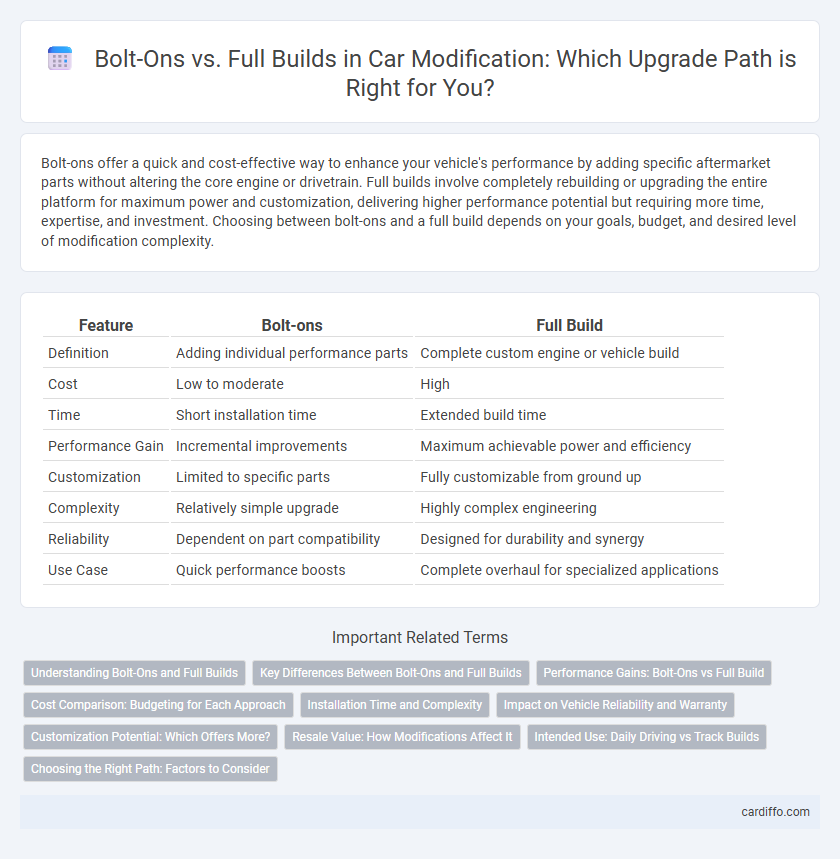Bolt-ons offer a quick and cost-effective way to enhance your vehicle's performance by adding specific aftermarket parts without altering the core engine or drivetrain. Full builds involve completely rebuilding or upgrading the entire platform for maximum power and customization, delivering higher performance potential but requiring more time, expertise, and investment. Choosing between bolt-ons and a full build depends on your goals, budget, and desired level of modification complexity.
Table of Comparison
| Feature | Bolt-ons | Full Build |
|---|---|---|
| Definition | Adding individual performance parts | Complete custom engine or vehicle build |
| Cost | Low to moderate | High |
| Time | Short installation time | Extended build time |
| Performance Gain | Incremental improvements | Maximum achievable power and efficiency |
| Customization | Limited to specific parts | Fully customizable from ground up |
| Complexity | Relatively simple upgrade | Highly complex engineering |
| Reliability | Dependent on part compatibility | Designed for durability and synergy |
| Use Case | Quick performance boosts | Complete overhaul for specialized applications |
Understanding Bolt-Ons and Full Builds
Bolt-ons involve upgrading individual components such as the exhaust, intake, or ECU to enhance specific performance aspects without altering the core engine setup. Full builds encompass comprehensive modifications including engine swaps, forced induction systems, and chassis reinforcements to achieve maximum power and reliability. Understanding the scope and goals of each approach helps determine whether incremental improvements or complete overhauls best suit performance objectives.
Key Differences Between Bolt-Ons and Full Builds
Bolt-ons involve adding aftermarket parts or accessories to enhance specific vehicle functions without altering the core structure, often providing incremental performance or aesthetic improvements. Full builds require extensive modifications that overhaul the engine, suspension, drivetrain, and body, resulting in a complete transformation tailored to specific performance goals. Key differences include cost, complexity, time investment, and customization level, with bolt-ons offering ease and affordability while full builds demand in-depth mechanical expertise and significant resources.
Performance Gains: Bolt-Ons vs Full Build
Bolt-ons improve performance by enhancing airflow, fuel delivery, and exhaust efficiency, typically yielding moderate horsepower gains of 10-30%. Full builds involve comprehensive engine rebuilds or replacements with upgraded internals, tuning, and supporting modifications, resulting in substantial performance increases often exceeding 50% horsepower gains. While bolt-ons offer cost-effective improvements and quicker installation, full builds deliver more reliable and scalable power improvements for high-performance applications.
Cost Comparison: Budgeting for Each Approach
Bolt-ons offer a cost-effective modification approach by allowing targeted enhancements, often ranging from $500 to $5,000 depending on the component and quality. Full builds, encompassing comprehensive vehicle transformations, typically require budgets starting at $20,000 and can exceed $100,000 based on customization depth and parts used. Evaluating long-term value versus upfront investment is crucial when choosing between incremental bolt-ons and extensive full build projects.
Installation Time and Complexity
Bolt-ons offer a quicker installation time, typically requiring less than an hour, making them ideal for users seeking straightforward modifications with minimal technical expertise. Full builds involve extensive customization, often taking several weeks and demanding advanced mechanical skills, specialized tools, and precise tuning to ensure optimal performance. Choosing between bolt-ons and full builds depends on balancing desired performance gains against installation complexity and time investment.
Impact on Vehicle Reliability and Warranty
Bolt-ons typically have a lower impact on vehicle reliability as they involve adding components without altering core systems, preserving factory warranty terms in most cases. Full builds often require extensive modifications to engine, transmission, and electronics, which can increase failure risks and void manufacturer warranties. Choosing bolt-ons is generally a safer option for maintaining reliability and warranty protection compared to comprehensive full builds.
Customization Potential: Which Offers More?
Bolt-ons offer targeted customization potential by allowing specific performance or aesthetic enhancements without extensive alterations, ideal for tailored upgrades. Full builds provide comprehensive customization, enabling complete control over every component and design aspect, resulting in a fully personalized outcome. For maximum customization potential, full builds surpass bolt-ons by offering deeper integration and limitless modification possibilities.
Resale Value: How Modifications Affect It
Bolt-ons often enhance resale value by providing noticeable performance upgrades without extensive vehicle alteration, appealing to buyers seeking improved functionality with minimal risk. Full builds may decrease resale value due to the subjective tastes and potential mechanical uncertainties they introduce, as extensive modifications can deter buyers preferring stock or lightly modified vehicles. Market trends indicate that lightly modified cars, especially with popular bolt-on parts like cold air intakes or exhaust systems, maintain higher demand and better resale prices compared to heavily customized full builds.
Intended Use: Daily Driving vs Track Builds
Bolt-ons enhance daily driving performance by improving engine efficiency and throttle response with minimal modifications, making them ideal for street cars. Full builds focus on comprehensive upgrades such as forced induction, engine internals, and suspension tuning to maximize power and handling for track-focused performance. Choosing between bolt-ons and full builds depends on balancing everyday reliability with the demands of competitive racing or spirited track sessions.
Choosing the Right Path: Factors to Consider
Choosing between bolt-ons and a full build depends on budget, desired performance gains, and project scope; bolt-ons offer incremental upgrades with lower initial costs, while a full build provides comprehensive enhancements but requires significant investment. Consider the vehicle's current condition, long-term goals, and compatibility with modifications to maximize effectiveness and reliability. Evaluating factors such as power output targets, intended vehicle use, and future upgrade potential ensures the chosen path aligns with performance expectations and financial limits.
Bolt-ons vs Full build Infographic

 cardiffo.com
cardiffo.com